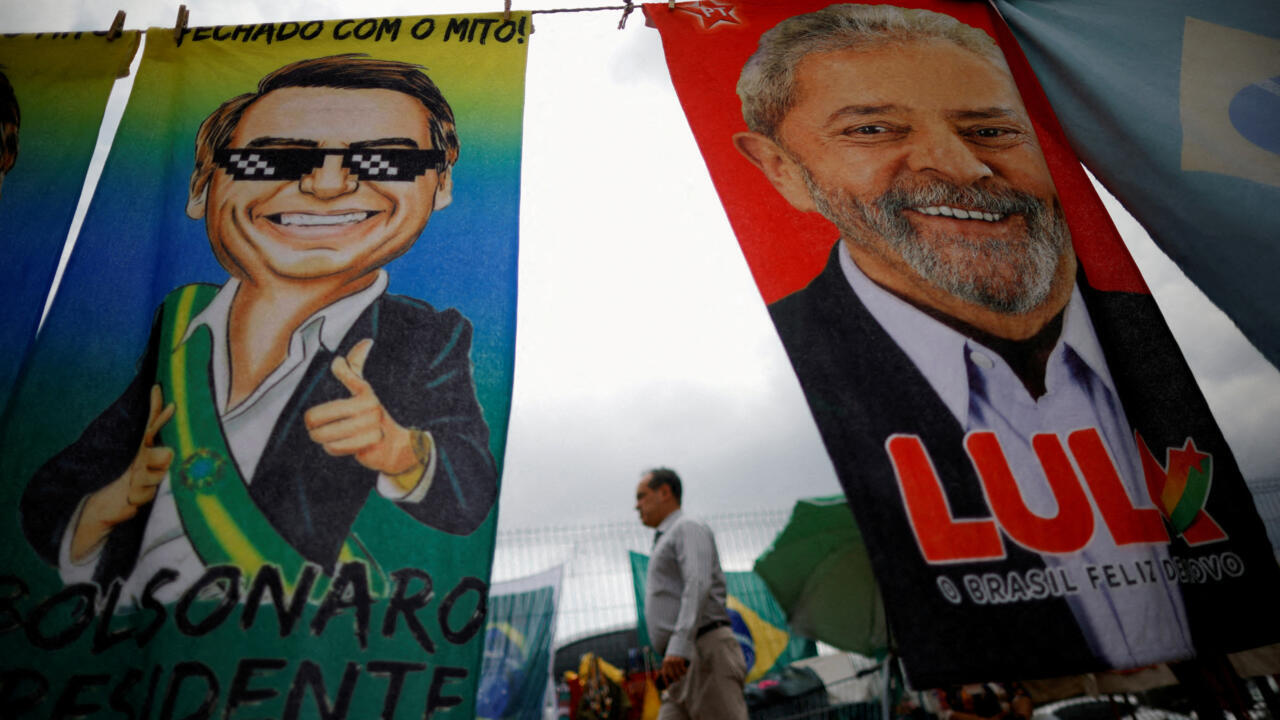Maintenance
Brazil: a difficult economic situation for the next president
The first round of the presidential election in Brazil will take place this Sunday, October 2.
MM.
Bolsonaro and Lula are the two big favourites.
Photo: Brasília, September 23, 2022. REUTERS - ADRIANO MACHADO
Text by: Pauline Gleize Follow
4 mins
More than 156 million Brazilians are called to the polls, Sunday, October 2, for general elections.
During the first round of the presidential election, the left-wing favorite, ex-president Luiz Inácio Lula da Silva (2003-2010) and the outgoing far-right head of state, Jair Bolsonaro, will notably face each other.
Analysis of the balance sheet of the mandate which is ending and the economic stakes of the one which opens with Gabriel Giménez Roche, teacher-researcher, associate professor of economics at Neoma Business School.
Advertising
Read more
RFI: What is the economic record of outgoing President Jair Bolsonaro?
Gabriel Giménez Roche:
We can reduce its balance sheet to one word: stagnation.
In fact, he promised a lot of things, reforms, privatizations, tax cuts and structural reforms, above all, to try to attract investors and stimulate the economy.
However, we saw very little.
As far as privatizations and tax cuts are concerned, we have seen practically nothing.
Administratively, he carried out cosmetic reforms instead.
It has sped up the processes a bit, for example, opening or closing businesses.
However, we haven't seen more than that.
There have also been adjustments in social programs.
For example, what used to be called the “Bolsa Família”, that is to say the family allowance, now they call it “Auxílio Brasil”, “Help Brazil”.
But it's still a program of the same nature as before, it's just a name change.
The program is endowed with a little more money.
There are also many accusations of electoral hijacking, but that is up for debate.
In any case, structurally, there has been no change.
And this is one of the big problems in Brazil.
Government after government, no matter the color, these governments are not making structural reforms.
So, often, they benefit or suffer from the situation, especially the international situation.
On the front page Brazil: the last debate between the candidates before the presidential election did not convince https://t.co/2hYZ3W5c0H pic.twitter.com/lLoEatzH4M
– RFI – Americas and Haiti (@RFIAmeriques) September 30, 2022
More than 33 million people suffer from hunger in Brazil, a figure up 73% from 2020, according to the Brazilian Food Security Research Network. Is this to be attributed to the global economic crisis or to the management of Jair Bolsonaro?
A bit of both.
On the one hand, it is true that the crisis falls in the middle of his mandate, so we do not know if he would have made reforms or not after 2019. But we have seen how he managed the Covid- 19, with a lot of bluster, and that didn't help.
This scared off some investors who might have gone to Brazil.
I still believe that we can partly question his management of the pandemic.
A lot of businesses have closed, there hasn't been much support for the economy.
We must also not forget that Brazil is a country that exports raw materials, whether agricultural products or minerals, and demand has dropped significantly during Covid.
Even if demand has picked up, there is the problem of the logistics value chains which have deteriorated a bit.
So, in fact, it's a combination of the two.
Presidential in Brazil: a country cut in two https://t.co/Si6YJs011T pic.twitter.com/zXaQc2J81y
– RFI – Americas and Haiti (@RFIAmeriques) September 30, 2022
What will be the economic stakes for the future president?
Brazil is not at all confronted with the same conjuncture as during the mandates of Lula for example.
There was then a super cycle of raw materials, with a lot of demand for these raw materials that Brazil exported, and there was a certain global geopolitical stability.
So we won't have that context, we will have a world with several countries that will suffer from inflation and have energy problems.
Therefore, global demand will be a bit depressed, interest rates will be higher.
Brazil is a country which, since at least 2015, has recorded an unemployment rate of 14%.
There is talk of inflation rising by 7%, or even more now with the problem linked to the conflict in Ukraine;
State indebtedness in relation to GDP which already easily exceeds 100%.
The country will therefore have more difficulty finding cheap capital abroad.
There isn't really a super commodity cycle: even if the demand is there, the supply chains are not yet fully recovered.
There is also a concern, because Brazil depends a lot on China, in terms of imports, especially industrial goods, and China also has its own problems at the industrial level.
So it's going to be very complicated, even if there are a lot of people betting on Lula's return.
They forget that Lula, in terms of structural reforms, did nothing at the time either.
He enjoyed, let's say, a period of economic happiness.
And this conjuncture, it will not be present.
So whoever the president is, even if he is proactive in terms of reforms, he will still be faced with a much more difficult situation.
►Read also: Brazil: these athletes who chose between Bolsonaro and Lula for the 2022 presidential election
Newsletter
Receive all the international news directly in your mailbox
I subscribe
Follow all the international news by downloading the RFI application
Brazil
Jair Bolsonaro
Luiz Inacio Lula da Silva
Economy
Social issues

